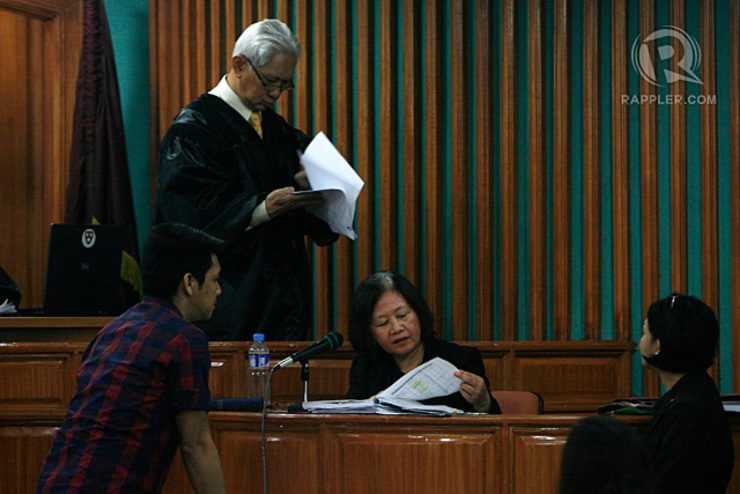SUMMARY
This is AI generated summarization, which may have errors. For context, always refer to the full article.

MANILA, Philippines – Despite its reputation for being prone to misuse and abuse, the Priority Development Assistance Fund (PDAF) of lawmakers was never fully checked by state auditors through the years.
This is because the Commission on Audit is undermanned while auditing is a “tedious process” and cannot cover all transactions due to the “volume of documents,” said Assistant Commissioner Susan Garcia on Friday, August 29.
Testifying on the alleged illegal diversion of lawmakers’ pork barrel, Garcia told the anti-graft court Sandiganbayan that resident auditors only randomly audit PDAF transactions coursed through their host government corporations.
Garcia was testifying before the Sandiganbayan Third Division about COA’s special audit of the use of PDAF from 2007 to 2009. COA had been criticized for not including the years of the Aquino administration in its audit of the PDAF.
Justice Samuel Martires said this selectivity is what fuels abuses in the handling of public funds in the country.
“I cannot understand why the COA has to be selective in which transactions has to be processed…. Graft and corruption in government will not stop. If what you have said this morning [is true], graft and corruption will continue for a century,” Martires said.
Garcia said the COA is undermanned. This is true with the Special Audit Office (SAO) and the Fraud Office (FO), offices tasked to audit transactions with “indications of fraud.”
“We only have less than 50 staff in the SAO, and we have more than 1,000 agencies to audit,” Garcia reasoned out.
In September 2013, the Senate finance committee found out that there was a 42% vacancy in COA said to be due to the difficulty in recruiting accountants willing to work for the agency.
The court division was hearing alleged PDAF scam mastermind Janet Lim Napoles’ plea to be allowed to post bail in relation to her plunder case with detained Senator Juan Ponce Enrile.
Garcia said the limited PDAF audit through the years was one of the reasons why the lump sum was the subject of the COA special audit report released in 2013.
The PDAF scam is an elaborate scheme diverting millions from lawmakers’ pork barrel to fictitious projects of dubious non-governmental organizations (NGOs) allegedly controlled by Napoles.
The PDAF, a lump sum meant for lawmakers’ community development pet projects, has since been declared unconstitutional by the Supreme Court.
Napoles allegedly gave kickbacks to cooperating lawmakers like Enrile to ensure PDAF proceeds went to her NGOs. Lawmakers either by themselves or, in the case of Enrile, through his representatives endorsed the Napoles NGOs as recipients of their PDAF.
Who is the procuring entity?
Earlier, Garcia explained to the court that the law considers NGOs transacting with government as goods. Hence, she said, they are covered by the procurement law. (READ: Sandigan justice: ‘Unclear’ laws inflame corruption)
This means the NGOs have to undergo either a public bidding or a negotiated procurement with government.
During the Friday hearing, Justice Martires questioned the witness on who in government is considered the procuring entity.
Garcia said it is the state firm or the implementing agency. In the case of the PDAF scam, these included: the Technology Resource Center (TRC), the National Agri-Business Corporation (Nabcor), and the National Livelihood Development Corporation (NLDC).
The question on which is the procuring entity – whether it was the office of the accused senators or the implementing agencies – is a crucial one in the PDAF scam cases.
Officers of state firms accused over the scam allege they merely contracted with the Napoles NGOs upon the endorsement of the senators. With this framework, the senators’ endorsements in effect substituted a bidding process.
On the other hand, lawmakers allege their endorsements are recommendatory at best. They argue that state firms were the ones dealing with the Napoles NGOs and implementing what later on were revealed to be ghost projects.
Garcia explained that implementing agencies are considered the procuring entities, as the Special Allotment Release Orders (SAROs) are directly released to them and not the senator.
A SARO is a document that authorizes an agency to incur expenditures.
Bidding required for accreditation
From the camp of Napoles, lawyer Lanee Cui-David questioned Garcia if NGOs contracted by state firms have to undergo public bidding.
Cui-David was conducting her cross-examination based on Garcia’s previous testimony alleging that the NGOs Napoles supposedly controlled broke rules in dealing with government.
These rules include a proper bidding process and an earmarked amount in the General Appropriations Act, among others. (READ: COA witness: Napoles NGOs broke all rules)
But Prosecutor Annielyn Cabelis objected to Cui-David’s line of questioning on the grounds that it was misleading.
Cui-David’s questioning was pertaining to the “selection” of NGOs for specific projects funded by PDAF, while the COA rule was pertaining to the “accreditation” of NGOs beforehand.
Cabelis said COA rules require that the accreditation of NGOs transacting with government go through the bids and awards committee of the agencies.
Garcia earlier explained that the Napoles-controlled NGOs were unaccredited and should not have been allowed to be part of any selection process for PDAF-funded projects. – Rappler.com
Add a comment
How does this make you feel?
There are no comments yet. Add your comment to start the conversation.